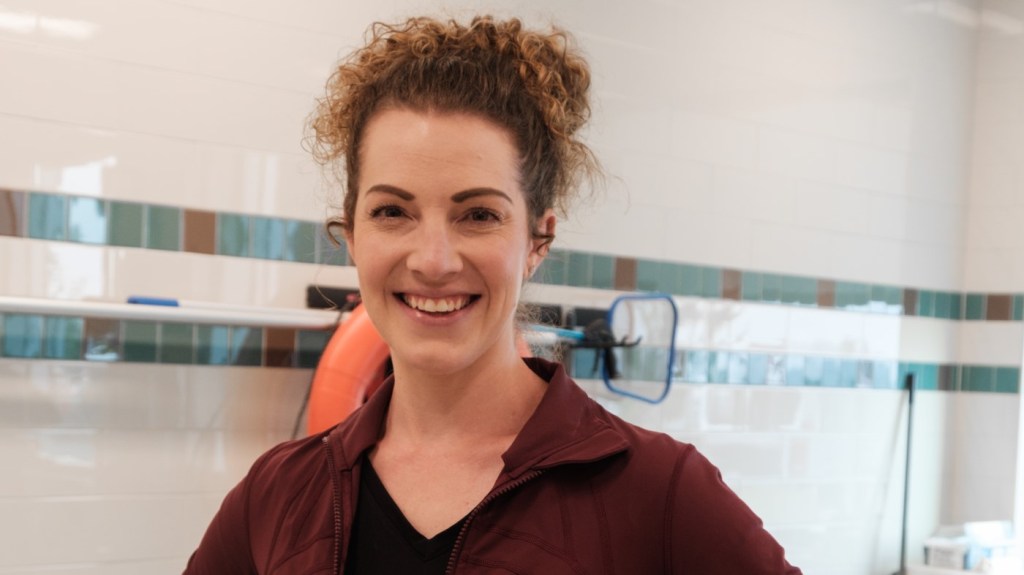
Recreational therapists plan, direct, and coordinate recreation-based medical treatment programs to help maintain or improve a patient’s physical, social, or emotional well-being—sometimes all three.
“As a recreational therapist, my goal is to get the Veterans I see back engaged in the community, doing all the things they enjoyed prior to their injury, and hopefully exposing them to some new things,” explained Matt Luitjohan, recreational therapist for the VA Health Care System in St. Louis.
At VA, our recreational therapists take on the added challenge of supporting Veterans who may be dealing with issues tied to unique circumstances, like previous combat deployments.
“It could be going out to a restaurant. It could be just going to the movies,” said Luitjohan. “My goal is to make sure they have the tools and the knowledge to do that independently and safely, so they’re more likely to do that.”
Taking therapy in new directions
Using a variety of techniques that range from art to sports and beyond, recreational therapists can be found throughout the VA health care network, but no matter where they are, you can bet they’re finding unique and exciting ways to provide our Veterans with the care and treatment they need.
- Battle Creek VA’s recreational therapy team recently hosted a low-vision golf scramble followed by lunch at Custer Greens on the VA campus, inviting visually impaired Veterans to compete alongside their guests and VA staff members.
- Earlier in the year, that same team partnered with two local nonprofit organizations to introduce paddleboarding to Veterans in their care, embracing aquatic therapy as a way to reduce stress, both physical and mental.
- The Honor VA Clinic in Kansas City developed a community garden to allow Veterans to participate in care-farming, which is the therapeutic use of farming practices to promote healing, education, mental wellness, and social well-being.
- Through a valued partnership with Paralyzed Veterans of America, Martinsburg VA offered a pickleball clinic for Veterans participating in its recreation therapy program, offering them access to the fastest growing sport in America.
“Participation in recreational sports—and particularly adaptive sports—improves our Veterans’ quality of life,” said Darren Yowell, recreation specialist at the Martinsburg VA Medical Center in West Virginia. “Whether it’s pickleball, swimming, air rifle, softball or more, we know all these offerings have a variety of health benefits.”
Working at the forefront of recreational therapy
VA is considered the founder of the recreational therapy occupation in the federal system, as well as its foremost user and supporter. In fact, VA boasts the largest rehabilitation program under one administration in the western hemisphere, so there’s no question we’re the best place to practice the trade.
“VA gives us so much support as far as options for our Veterans. I mean, look where we’re at right now,” said Luitjohan, who shared information about his career while participating with Veterans at the 37th annual National Disabled Veterans Winter Sports Clinic in Snowmass, Colorado. “Right now, I’m sitting on a mountain in Colorado helping my Veterans ski. VA very much encourages recreation therapy and really supports us.”
With the breadth of our investment in recreational therapy, we also offer opportunities to specialize in a variety of care fields:
- Cardiac rehabilitation
- Chronic illness
- Drug and alcohol abuse
- Geriatrics
- Psychiatrics
- Spinal cord injuries
- General medical and surgical
Our recreational therapists are also highly trained. To join VA in this role, you must possess at least a bachelor’s degree, and certification through the National Council for Therapeutic Recreation Certification (NCTRC) confirms that, as a certified therapeutic recreational specialist, you understand the best and safest ways to get your patients back to their best lives.
The benefits of a VA career
Regardless of whatever avenue you choose to pursue in recreational therapy, you’ll have access to a network of support, as well as an array of employment benefits that will impact how you envision your future:
- Up to 26 days of paid leave, 13 sick days annually, and 11 paid federal holidays each year, as well as 12 weeks of parental leave
- Federal insurance programs and a variety of plans that all cover preexisting conditions, with 75% of health premiums paid by us
- The Federal Employees Retirement System (FERS), which allows you to tax-defer a portion of your income each year, similar to a 401(k), with an automatic 1% government contribution
“It is an excellent place to work,” said Luitjohan.
Work at VA
The energy and care our recreational therapists bring to their work is a tribute to our mission of service, a mission you can join in, as well.
- EXPLORE recreational therapy careers at VA.
- EXAMINE the employment benefits we offer.
- EMBRACE our mission of service.
- ENHANCE your job search at VA Careers.


